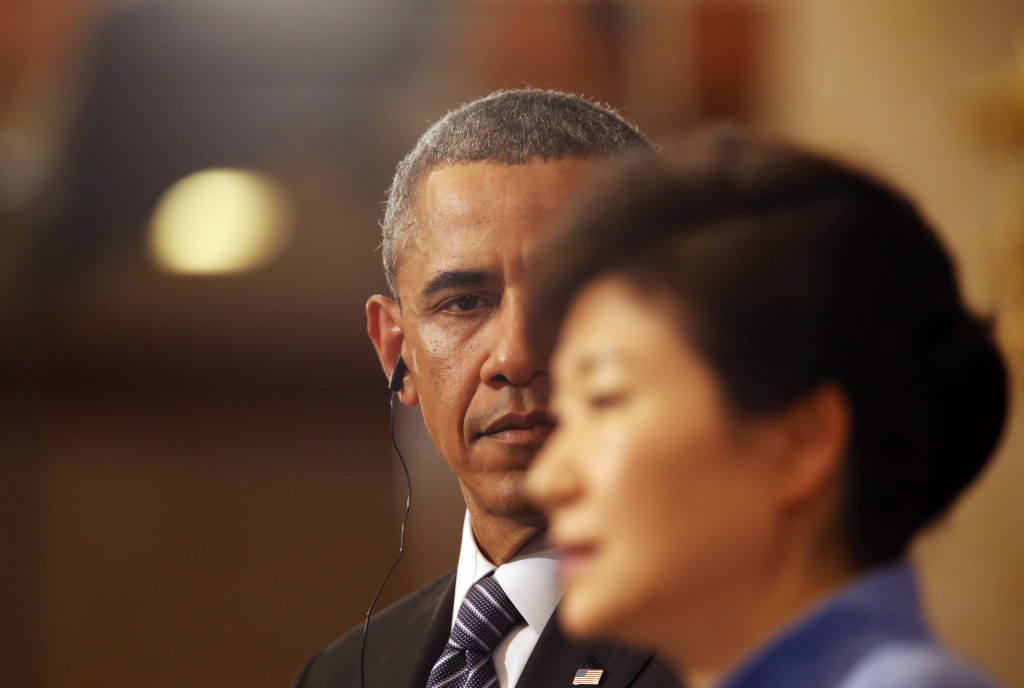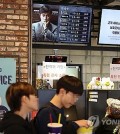- California Assembly OKs highest minimum wage in nation
- S. Korea unveils first graphic cigarette warnings
- US joins with South Korea, Japan in bid to deter North Korea
- LPGA golfer Chun In-gee finally back in action
- S. Korea won’t be top seed in final World Cup qualification round
- US men’s soccer misses 2nd straight Olympics
- US back on track in qualifying with 4-0 win over Guatemala
- High-intensity workout injuries spawn cottage industry
- CDC expands range of Zika mosquitoes into parts of Northeast
- Who knew? ‘The Walking Dead’ is helping families connect
Obama, Park agree to reconsider wartime command transfer

South Korean President Park Geun-hye, right, answers a report’s question as U.S. President Barack Obama listens during a joint news conference following their meeting at the presidential Blue House in Seoul, Friday, April 25, 2014. (AP Photo/Kim Hong-Ji, Pool)
SEOUL, April 25 (Yonhap) — South Korean President Park Geun-hye and U.S. President Barack Obama agreed Friday that the two allies can reconsider the timing of next year’s transfer of wartime control of South Korean troops from Washington to Seoul.
The two leaders also warned North Korea not to take any provocative steps amid growing concerns that the communist nation is fully ready to conduct a fourth nuclear test. Obama told Pyongyang: “Threats will get North Korea nothing, other than greater isolation.”
The agreement on troop command is the most concrete outcome of the talks. It means the U.S. agrees in principle to Seoul’s request for a delay in the transfer of control, although the specifics, such as how far the handover should be pushed back, must be determined later.
The decision is an expression of Washington’s firm security commitment to South Korea and could send a strong message to North Korea at a time of high tensions on the divided peninsula amid growing concerns that the communist nation could carry out yet another nuclear test.
“We can reconsider the 2015 timeline for transferring operational control for our alliance” to cope with threats from North Korea, Obama said during a joint news conference with Park after their summit meeting.
South Korea handed over control of its forces to the U.S. during the 1950-53 Korean War to defend against invading troops from North Korea. Peacetime control of its forces was returned in 1994, and South Korea is scheduled to get back the wartime control in December 2015.
But last year, Seoul asked for a delay in the transfer after North Korea conducted its third nuclear test, saying the security situation on the peninsula was markedly different from when the transfer was agreed upon a few years ago.
Obama flew in from Japan earlier in the day for a two-day visit, his fourth to South Korea, making Seoul the president’s most visited foreign city. South Korea is the second leg of his four-nation Asian tour that will later take him to Malaysia and the Philippines.
The visit came as South Korea has been in national mourning over the tragic sinking of the ferry Sewol that left more than 300 people dead or missing, mostly high school students.
“For now, I just want to express, on the part of the American people, condolences for the incredible loss that has taken place,” Obama said at the start of talks with Park. “As allies but also friends, we join you in mourning the missing, and especially the young people.” The two leaders and their delegations also observed a moment of silence at Obama’s suggestion.
In a token of sympathy, Obama handed Park a U.S. national flag.
“This American flag flew over the White House the same day that so many lost their lives aboard the ferry Sewol,” read a message that came with the flag. “It reflects our deep condolences, our solidarity with you at this difficult time, and our great pride in calling you an ally and friend.” North Korea, including its nuclear program, was a key topic for Park’s talks with Obama as the issue has gained urgency with intelligence suggesting that Pyongyang has completed preparations for what would be its fourth nuclear test.
“The United States and South Korea stand shoulder to shoulder both in the face of Pyongyang’s provocations and in our refusal to accept a nuclear North Korea,” Obama said during the joint news conference.
“The North Korea situation is of direct concern to us not only because it threatens our key allies in the region … but it also poses direct threat to us,” Obama said, adding that Pyongyang’s missile and nuclear technologies “poses a threat to the U.S” when they are matched with a “thoroughly irresponsible foreign policy.” Last month, North Korea threatened to conduct a “new form of nuclear test,” apparently referring to a blast involving a nuclear device built with highly enriched uranium, its second source of fissile material used for atomic bombs after plutonium.
The North previously conducted nuclear tests in 2006, 2009 and 2013.
Both Park and Obama expressed hope that China will play a greater role in deterring the North.
“China is beginning to realize that North Korea is not just a nuisance. This is a significant problem to their own security,” Obama said. “We’ve encouraged them to exert greater influence over North Korea.” Park also urged China to exercise its leadership to rein in North Korea.
Other topics for Park’s talks with Obama included enhancing three-way security cooperation between South Korea, the U.S. and Japan, such as by forging a military intelligence-sharing pact, as well as Washington’s push for a regional missile defense system.
Both Park and Obama said that South Korea will pursue its own missile defense system while working together with the U.S. to enhance its interoperability with the U.S. missile defense system.
The agreement was considered a compromise between Washington’s push for South Korea to join its missile defense system and Seoul’s reluctance to do so over concerns that such a move would raise tensions with China.
On trilateral cooperation between Seoul, Washington and Tokyo, the two sides said in a “joint fact sheet” issued after the talks that they recognize the importance of trilateral information sharing to respond to North Korean nuclear and missile threats.
The U.S. hopes that its two biggest Asian allies — South Korea and Japan — will repair their relations that have been frayed badly over issues related to Japan’s colonial rule of Korea, and cooperate more closely on security matters, in part to keep a rising China in check.
As part of such efforts, Obama brokered a three-way summit with the South Korean president and Japanese Prime Minister Shinzo Abe last month when the three leaders gathered in the Dutch city of The Hague for an international conference on anti-nuclear terrorism.
That meeting marked the first time that Park and Abe held formal talks since they took office more than a year ago. Despite Obama’s efforts, however, there has since been no marked improvement in relations between Seoul and Tokyo.
On Friday, Park stressed that Japan should first take sincere and genuine steps to resolve the issue of Japan’s sexual enslavement of Korean women during World War II, the biggest thorn in their relations, if their ties are to improve.
Obama also urged Japan to face up to history and address the sexual slavery issue.
“This was a terrible, egregious violation of human rights. Those women were violated in ways that even in the midst of war were shocking and they deserve to be heard, they deserve to be respected,” he said.
Obama also said that he believes Japanese Prime Minister Shinzo Abe “recognizes, and certainly the Japanese people recognize, that the past is something that has to be recognized, honestly and fairly.” But he also urged Seoul and Tokyo to look “forward” and resolve their disputes as their interests converge.
During the summit, the two sides “reaffirmed our commitment to strengthen our efforts to fully implement the Korea-U.S. free trade agreement to ensure that the economic benefits of the agreement are realized for both sides,” according to the joint fact sheet.
On the occasion of the summit, the two countries significantly narrowed their differences on the issue of rules of origin that have kept the trade deal from being fully implemented, according to Seoul’s senior presidential economic secretary Cho Won-dong.
Obama brought nine ancient Korean seals with him and returned them to South Korea. The national treasures were shipped out of Korea during the 1950-53 Korean War, and their return is seen as a sign of the close friendship between the two countries.
Last November, U.S. customs authorities seized the seals from the family of a deceased U.S. Marine lieutenant who served in the three-year war in Korea. Among them is the Hwangjejibo (Seal of the Emperor) that King Gojong of the Joseon Dynasty (1392-1910) made upon the establishment of the Korean Empire in 1897.
Obama’s trip also included a visit to the War Memorial of Korea and to Gyeongbok Palace in central Seoul. On Saturday, he is scheduled to hold a meeting with business leaders before he and Park visit the Combined Forces Command (CFC) at the headquarters in Seoul of some 28,500 American troops stationed in Korea.










![넷플릭스 2025년 라인업 공개 [넷플릭스 제공. 재판매 및 DB 금지]](http://www.koreatimesus.com/wp-content/uploads/2025/04/20250415135202671-copy-199x223.jpg)




